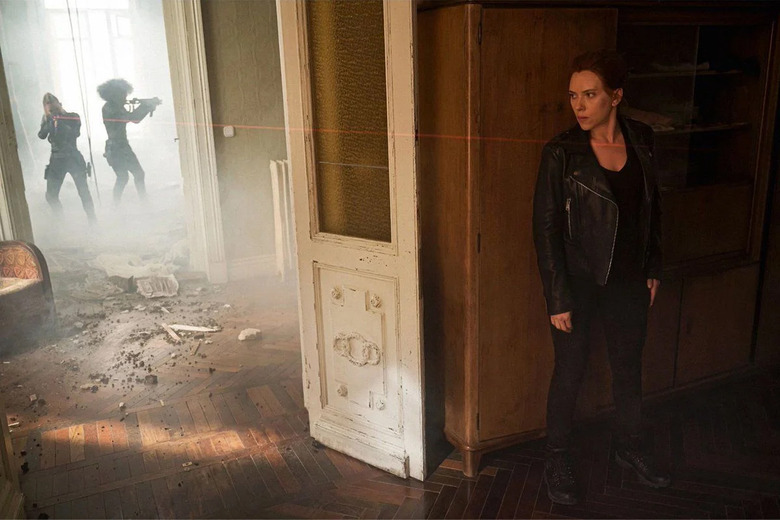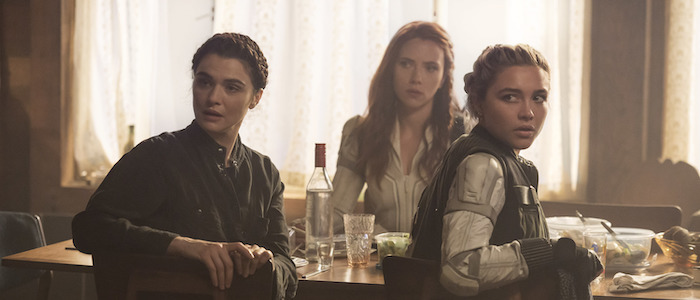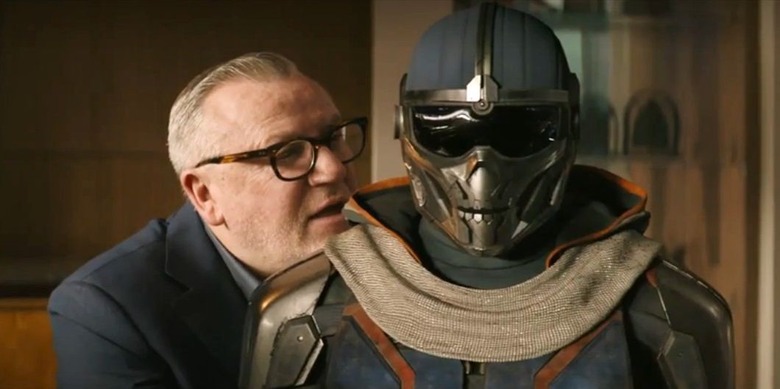'Black Widow' Spoiler Review: The Marvel Movie Most Hampered By Being In The MCU
Let's make this clear right from the start: Black Widow certainly owes its apparent success (not to mention its very existence) to director Cate Shortland, writers Eric Pearson, Jac Schaeffer, and Ned Benson, and their armies of cast and crew. But most importantly, and this might be terribly controversial to say, it comes down to the Marvel Cinematic Universe at large.
Thanks to the careful bricklaying spearheaded by Kevin Feige over the last decade-plus, this patient approach has built the MCU into the powerhouse that it's become. As proven by a similarly family-oriented saga that has only gained more and more steam over time, the key to its popularity is actually pretty simple. The MCU's secret sauce lies in the fact that audiences — stick with me here — enjoy spending time with characters they like. Natasha Romanoff, portrayed by Scarlett Johansson since 2010 and appearing in eight different MCU films until the character's death in Avengers: Endgame, certainly fits the bill.
But while watching Black Widow, I was struck by a startling realization pretty early on: for all its MCU connections and references and callbacks (and there are a lot of them)... the only scenes I was ever really connecting with were the ones that forcefully relegated the MCU in the background and instead focused on the story at hand. The uneven movie we're left with serves as the metatextual extension of Natasha's own emotional tug-of-war between the Avengers and her Russian "family." Like the conflicted super-spy caught between disparate allegiances, Black Widow is a superhero movie at war with itself.
Major spoilers follow for Black Widow.
"I'm a Real Movie Now!"
Marvel movies have referenced Pinocchio in the past, with Avengers: Age of Ultron focusing on the puppet's "strings" more so than his earnest desire to finally become "a real boy." Black Widow, however, inadvertently brings to mind that latter quote through its well-meaning intentions to act more like a "real movie" rather than just another piece of forgettable superhero fare.
If you remember (and I'm sure you do), filmmaking legend Martin Scorsese once launched a thousand furious social media discourses in October of 2019 when he asserted that Marvel movies were akin to "theme parks," subsequently opening the door for debates between that and what exactly constitutes "cinema." Scorsese's own eloquent and richly insightful words speak for themselves so let's not rehash them here, but here's why I'm bringing it up: filming for Black Widow commenced from May to October that same year and, while it was certainly too late to structure some sort of clapback within the script itself (although standard reshoots took place throughout 2020), it's hard not to see that narrative hanging over the heads of everyone involved with the production and editing of Black Widow.
Right from the start, Black Widow seems to have a chip on its shoulder and demands itself to be taken seriously as a proper film in its own right. And you know what? It absolutely earns that respect in the early going.
The surprisingly gripping cold open establishes a young Natasha and Yelena in their comfortable home in 1995 Ohio and their relationships with parental figures Melina (Rachel Weisz) and Alexei (David Harbour). Although the situation soon explodes into some tense action as the undercover family inevitably goes on the run, we experience several minutes before the film name-drops any pre-existing Marvel characters or even shows off any feats of superhuman strength. It's simply an effective, self-contained prologue that establishes the core themes and ideas the film would (ostensibly) be dealing with as the young sisters see their idyllic family life shatter before their eyes. There's even a brutally mood-setting opening title sequence, a rarity in the MCU and yet another early indication that Black Widow is aiming to be different from the pack.
Let Them All Talk
I've written previously about my craving for Marvel movies to reincorporate something as simple as conversations in their movies again, crucial breathing room that used to be the norm in earlier phases but dropped off as precious screen time apparently needed to be spent elsewhere on cosmic threats, zero-calorie banter, and complex action sequences. So it's a particularly cruel irony that an MCU film finally takes my complaints to heart... only to do little to nothing with all that dialogue.
Again, there's an impressive amount of scenes featuring characters have one-on-one conversations with each other, but so few of these moments ever actually bring resolution (or even suggest a way forward, at the very least) or unearth any new layers we didn't already know. Florence Pugh, in particular, is saddled with simply stating Yelena's motivations and thoughts out loud as bluntly and robotically as she can (which is much less a performance issue and more a writing/directing one, as Pugh shines in every other scene), turning any potential subtext into outright text. Think of the centerpiece of the film set at Melina's distant homestead, where the family reunion quickly devolves into heightened family drama. There was potential here for Yelena and father figure Alexei to hash out their differences and reach a new understanding of each other, but much of it is played for laughs at Harbour's expense and all their conflict is resolved far too quickly in a rendition of Don McLean's "American Pie." Similarly, a third act moment where Alexei showcases a rare moment of vulnerability to Natasha is cut off at its knees, all to make room for a face mask reveal recycled from The Winter Soldier that's hardly worth the bait-and-switch.
And yet, none of this would necessarily be so bad if only Black Widow bothered to communicate character through action or any other means. Instead, we're left with rote exercises in dialogue from a movie that wants to seem more low-key, restrained, and thoughtful than it actually is.
Natasha ultimately realizes that she can accept both her Black Widow family as well as her Avengers team and, in effect, have it both ways. For better or worse, the same can't exactly hold true for the movie itself.
'Solo' Syndrome
Let me ask you, dear reader: When you first heard Loki menacingly allude to "the hospital fire" or "Dreykov's daughter" to Natasha way back in 2012's The Avengers, were you consumed with the need to witness these events depicted in live action someday with excruciating detail? Or did you accept throwaway lines like those or Clint and Natasha's "Just like Budapest all over again" reference as trivial details meant to flesh out their past history and add layers of world-building that extends beyond what we ever see on-screen? Well, Black Widow certainly assumes the former.
In its pursuit to service the shared universe aspects of it all, Black Widow does itself no favors by falling victim to as bad a case of "prequelitis" as I've seen since Solo: A Star War Story decided to run through a checklist of Han Solo origin stories for no real reason at all.
Everything from General Dreykov himself (who as played by Ray Winstone is, dramatic drum roll please, not actually dead! Except I don't think I was ever meant to think otherwise in previous movies, though?) to the cloying return of that "Red on my ledger" remark from The Avengers (which retroactively turns Natasha's arc in that film into little more than a weirdly specific family mantra here?) to that random green vest Natasha wore in Avengers: Infinity War is up for grabs here, and almost none of it lends any actual meaning here or to previous films.
It's a shame, really, because this over-reliance on filling in backstory and providing answers to questions that few ever asked in the first place can't help but feel a little suspect. It belies a sense of insecurity at best or a creative misfire at worst, one that speaks to Marvel's difficulty in putting out a long overdue solo film for their first major female character in live action. Much like Han Solo, the character of Black Widow should already be deep enough at this point to support all sorts of truly original stories. Instead, what starts as a relatively grounded tale centered on a sisterly bond turns into yet another nostalgia trip that only hardcore fans would ever be fully invested in.
As tends to be the case with prequels, the nagging weight of past history extends beyond the screen as well, given the (arguably ill-advised) decision to kill Natasha off in Endgame. Right when Black Widow positions Natasha's fate entirely up in the air (literally!) and the world hangs in the balance, you may have found yourself remembering that Natasha lives to see another day and the threat of Dreykov's Black Widow scheme utterly pales in comparison to the oncoming Mad Titan.
With that in mind, wouldn't a more lower-stakes journey have been the way to go here? Maybe Black Widow's instincts were right all along in eschewing the overarching Marvel brand in favor of a more boots-on-the-ground perspective...but too bad it never commits to that or fully sheds the heavy burden of shared universe connections.
This is a film that's perpetually torn in two. Even though Natasha finally achieves a sense of zen about her place in the world, Black Widow is never extended the same courtesy. Loyal fans may consider this to be a perfectly serviceable, sometimes inspired superhero movie. But when it comes to giving Natasha Romanoff her due and sending her off into the sunset, her journey crushes under the weight of the real star of the show: the MCU.



